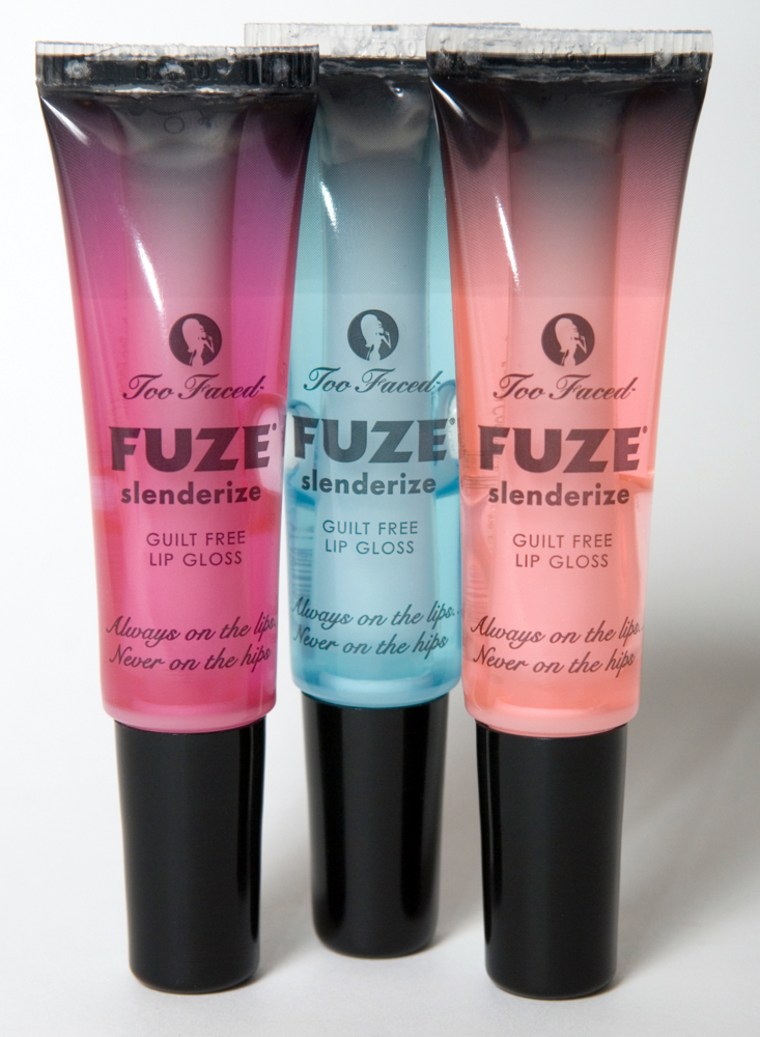Rub on a lip gloss and lose weight. Sip a berry drink and look younger. Down some iced tea and burn calories. If only it were that simple.
“Always on the lips … never on the hips,” promise ads for the new "Fuze Slenderize Guilt free" lip gloss. Marketed by Too Faced Cosmetics, the flavored lip gloss claims it can suppress your appetite with the same mix of minerals and ingredients found in Coca-Cola's Fuze energy fruit drinks.
As Americans continue to struggle with weight loss, marketers are getting more outlandish with their quick-fix diet claims. At least with Fuze, a blend of the minerals chromium and L-carnitine, along a hydroxycitric acide extract called Super Citrimax, the calorie conscious had to drink a full bottle of the beverage to get the promised hunger-easing metabolism boost. Now all that's required is to slather it on your mouth, according to the company.
The lip gloss works because "the skin on the lips is very thin...you will ingest some of it," says Too Faced founder Jerrod Blandino. It's playing with nutritional science in a "girly kind of way," he says.
The fruit-flavored lip gloss may taste yummy, but don't expect to get skinny hips from shiny lips, experts say.
"There’s no magic bullet in any of the ingredients, says Joy Bauer, TODAY's nutrition expert and author of "Food Cures" (Rodale, 2007). "If dieting were as easy as putting on lip gloss or downing a drink, we would not be dealing with such an obesity problem, and everybody would be a size 2."
Oreos could blow the benefit
Bauer notes that there's no hard evidence linking these products to weight loss, although Coke and Nestlé, which market the diet green-tea drink Enviga, tout their small 2007 study. In a three-day study with 31 healthy men and women, the companies found that Enviga drinkers burned 106 more calories than participants who drank a plain beverage.
But the study only included slim people, and three cans daily for three days is not enough to claim long-term calorie-burning, critics charge.
Jeffrey Blumberg, director of Tufts University’s Antioxidants Research Laboratory says you’d have to drink about nine cans of Enviga, for example, at around $1.50 a pop, to burn up 100 calories.
“Eating just a couple Oreo cookies would completely override that benefit,” says Blumberg. “There’s some evidence of calorie-burning from green tea, but the effects are very modest.”
The way these products might help you lose weight is if you're drinking them instead of calorie-laden fruit juice and sodas, say Bauer. (Fuze drinks have about 10 calories per serving; Enviga, 5 calories per serving.) Putting on a flavored lip gloss could be a distraction from eating, similar to chewing sugar-free gum, she says.
Sipping for smoother skin
Even if you can't lip balm your way to thin, what about sipping your way to smoother skin? Another new entry blurring the lines between beauty, beverages and "girly science" is a line of fruit beverages from cosmetics company Borba Skin Balance. Its drinks promise to do everything from protecting dry skin to fixing wrinkles – for about $3 a bottle.
Borba, a Woodland Hills, Calif. skin care company partnered with beer marketers Anheuser-Busch to distribute what the company promotes as drinkable skin care products. Borba won’t reveal specifics about the active ingredients, which appear to be the antioxidant Vitamins C and E. But CEO Scott-Vincent Borba insists the nutrients’ benefits are proven.
"All our products are tested in independent research labs — that’s how we back up our claims," says Borba. "But we don’t tell consumers they’ll see X result in X number of days because everyone’s system is unique."
Because the U.S. Food and Drug Administration considers these products supplements, not drugs, it allows them more latitude with promotional claims. Where drugs need approval from the FDA before being sold, supplements do not. As long as supplements are safe to use and their labels not blatantly untrue, the FDA doesn’t interfere.
In other countries, the rules are laxer still. In Japan, for example, Coca-Cola sells the diet drink Love Body, which contains the supposedly breast-enlarging ingredient fenugreek.
Blumberg sees a lack of science supporting the beverages that tout their anti-aging properties. The antioxidants they cite as active ingredients may help prevent skin damage, he says, but they don’t reverse it.
More than that, the drinks don’t contain enough antioxidants to pack a beneficial punch. If they did, they’d taste nasty, Blumberg explains.
“These are expensive products that contain less vitamins than a daily multivitamin you’d get for a nickel,” says Blumberg. “For the best skin benefit, take that multivitamin and eat some fruit.”
Bridget Murray Law is a freelance writer based in Washington D.C.
